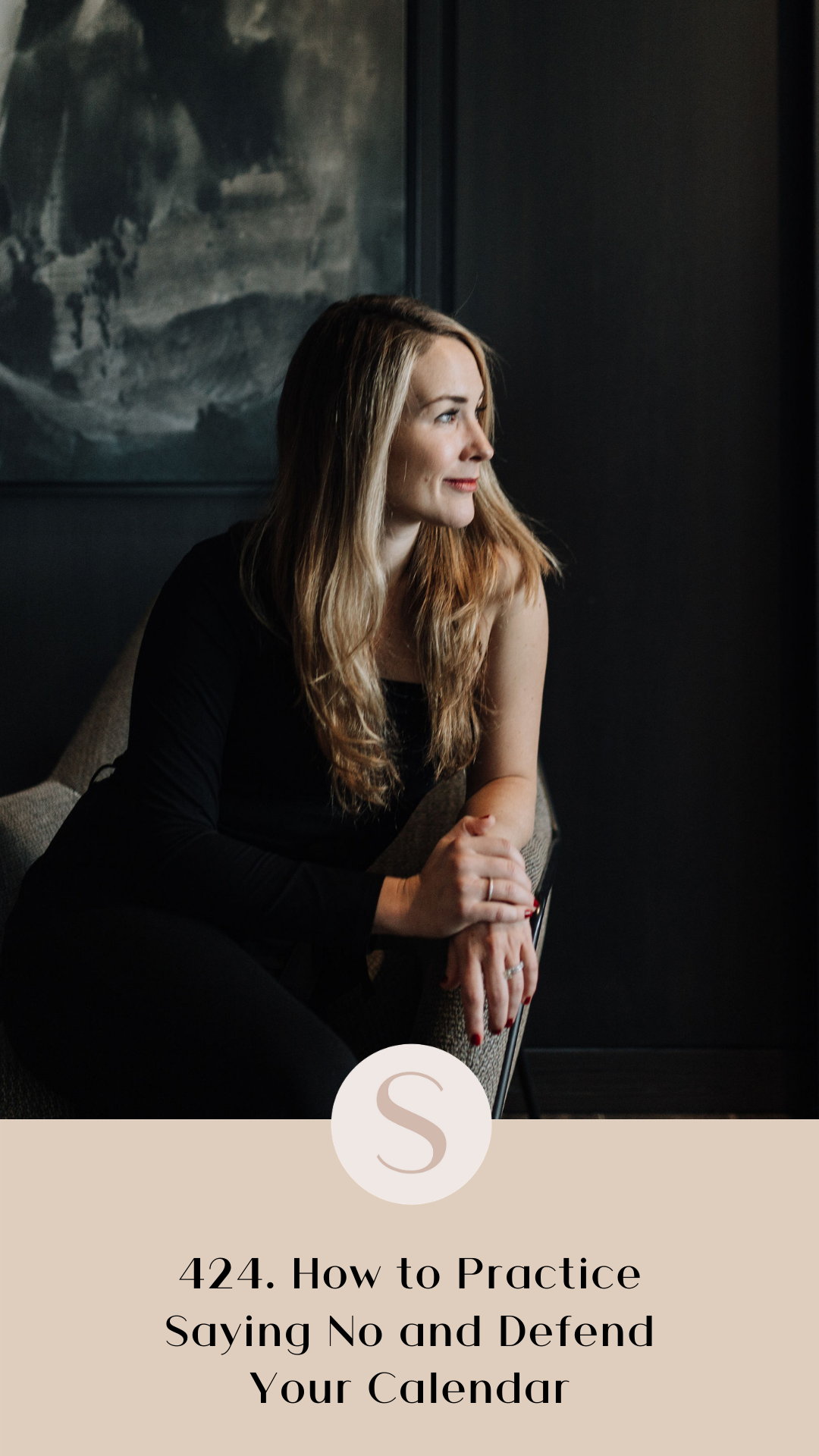SDH 424: How to Practice Saying No and Defend Your Calendar with Amanda Boleyn
Today I want to talk about how to practice saying “No” and defending your calendar. Sometimes that “No” is to someone outside of you and sometimes that “No” is to you, yourself as the business owner. As you're building your business there are so many things that are vying for your attention, from what is happening in your personal life, to all of the things that you need to get done in your business. The most important thing for you in the beginning stages is to keep the main thing, the main thing and you do that by saying, “no.” Because when you say “YES” to one thing you’re indirectly saying “NO” to another.
If you say YES to a night out with girlfriends, what is the trade-off, what are you indirectly saying NO to? Where your focus goes, energy flows, and results will show. It is easy to say you’re going to work on your business every Monday and Tuesday night from 6-8 PM, but when the invite to do a girls’ dinner comes across via text, then what?
The goal isn’t to say your decision is right or wrong, the goal is to bring awareness to the decision so that you can make an intentional decision knowing what the trade-offs are.
Reasons Why We Don’t Say “NO”:
There might be multiple reasons why we don’t say NO, especially when we know we need to, and here are a couple of reasons.
Not clear on why we’re saying no. This requires us to get clear on what is most important to us in our life right now. What is most important in this season of life for you? What is your priority? Is it your family, your health, your business? What is it? When you’re clear on your priority it’ll be much easier to keep the main thing, the main thing. If it is your health, it’ll be much easier for you to say “No” when the server asks you if you want dessert because you’ll already know your why. If it is your business, it’ll be much easier to defend the time you scheduled on your calendar to work on your business rather than saying “yes” to a girls' night.
Fear of disappointing the other person. This reason is super common and I struggled with it for a bit of time as well. If you’re someone who is a people pleaser you may find yourself not saying “No” out of fear of disappointing the other person. On the flip side, if you gain pleasure from saying yes but it is costing you what you really want in life then you’ll want to examine the real reason why you said yes. I used to say yes to everything because I wanted to be that person that was everywhere (because of my ego), but not because that is truly what I wanted. To make that transition I needed an identity shift.
FOMO. Fear of missing out. When we say “no” to a party, maybe a work opportunity, we turn down a client, we turn down a big partnership opportunity, we experience the fear of missing out. But in order to achieve our goals and dreams, the missing out piece is part of the equation. The good news is that we don’t have to look at it as missing out because we’re making room for other things to come into our lives.
What Happens When We Don’t Say “No”:
We can start to spin out, we get overwhelmed and start to think that everyone is taking our time away from us, but the reality is that we are the ones who control to whom, and to what, we give our time. It is up to us to reclaim it.
We start to get resentful, life gets chaotic, we get frustrated and ultimately we don’t reach our goals. We start to burn out because we are overextending ourselves.
We start to blame others for why we’re not reaching our goals.
No one else will protect or defend our calendars or goals for us, we must do that.
Where to Start & What to Expect:
If you’re not used to saying, “No” it can feel very imposterous. Like you ‘shouldn’t be saying “no”’ and ‘how dare you say “no”’. What is happening is that your mind has been wired to NOT say “no” for some time. Feeling like an imposter is completely normal anytime you start to modify habits, change who you are, or do something different that you’ve never done before. We all have felt imposter syndrome at some point, whether it be at a party we didn’t think we were cool enough for, or an outfit that was too chic for what we normally would wear. Or when starting a business thinking “who am I to do this?” Over time, that imposter feeling fades into the background because you start to take on a new identity. Over time, as you begin to practice and say “No” it’ll start to feel more natural because you’re taking on a new identity.
When you’re considering saying “yes” to something, and you know you should be saying “no”...do your best to make decisions ahead of time and not in the moment, otherwise your brain will emotionally hijack you. But even when you’re in the moment, your brain will still try to get you to do something you don’t want to do because our brains are wired for pleasure. For example, let’s say you want to lose weight and you’re going out to dinner, you decide ahead of time that you’re not going to get dessert but then the waiter comes over to the table and asks if you want dessert. In that moment when you’re starting to practice saying “No” your brain will pause and want you to say YES! But what I want you to do is use this as an opportunity to remind yourself of your why, and think of the BENEFIT and what you gain by saying NO, not what you’re going to “lose” or miss out on. By saying “No” to dessert, what are you gaining? By saying “No” to a girls' dinner, and instead working on your business, what are you gaining? It is no secret that I love to go to bed much earlier than most of my friends, so when I’m with them on the weekends, I’m usually the first one that leaves. At first, it was really hard because I didn’t want to miss out but then I considered the cost of staying longer and realized that it wasn’t worth it to me. That missing out on the tail end of the evening was okay because the benefit of waking up and feeling good in the morning mattered more to me.
Start small. Start practicing by using easy, low-risk situations to practice saying no. This will help you build up your muscle. Maybe there is an email in your inbox of someone wanting to partner with you and you know it isn’t the right fit, can you open up your inbox and politely decline right now? Maybe there is a DM in your Instagram account and it is someone who wants you to try their new software, can you politely tell them, “Thank you but I’ll pass”? Again, create those small wins to help build up your muscle so that you protect and defend what is on your calendar.
Final Note:
Be prepared to be uncomfortable and be prepared to disappoint others but know that their disappointment has nothing to do with you, only their expectations of you and when you didn’t meet them. It is not your job to meet the expectations of others, only the ones you have of yourself. This is really key because you no longer make decisions based on how you think the other person is going to react, and instead, make decisions based on what you truly want and your goals.
Insights:
“The most important thing for you in the beginning stages is to keep the main thing, the main thing and you do that by saying, “no.” Because when you say “YES” to one thing you’re indirectly saying “NO” to another.”
“The goal isn’t to say your decision is right or wrong, the goal is to bring awareness to the decision so that you can make an intentional decision knowing what the trade-offs are.“
“No one else will protect or defend our calendars or goals for us, we must do that.”
“Do your best to make decisions ahead of time and not in the moment.”
“Make decisions based on what you truly want and your goals.”











